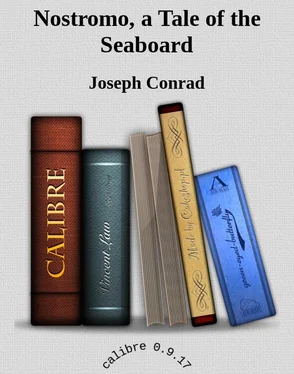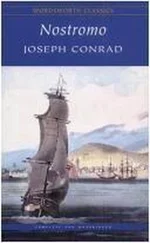Joseph Conrad - Nostromo, a Tale of the Seaboard
Здесь есть возможность читать онлайн «Joseph Conrad - Nostromo, a Tale of the Seaboard» весь текст электронной книги совершенно бесплатно (целиком полную версию без сокращений). В некоторых случаях можно слушать аудио, скачать через торрент в формате fb2 и присутствует краткое содержание. Жанр: Старинная литература, на английском языке. Описание произведения, (предисловие) а так же отзывы посетителей доступны на портале библиотеки ЛибКат.
- Название:Nostromo, a Tale of the Seaboard
- Автор:
- Жанр:
- Год:неизвестен
- ISBN:нет данных
- Рейтинг книги:4 / 5. Голосов: 1
-
Избранное:Добавить в избранное
- Отзывы:
-
Ваша оценка:
- 80
- 1
- 2
- 3
- 4
- 5
Nostromo, a Tale of the Seaboard: краткое содержание, описание и аннотация
Предлагаем к чтению аннотацию, описание, краткое содержание или предисловие (зависит от того, что написал сам автор книги «Nostromo, a Tale of the Seaboard»). Если вы не нашли необходимую информацию о книге — напишите в комментариях, мы постараемся отыскать её.
Nostromo, a Tale of the Seaboard — читать онлайн бесплатно полную книгу (весь текст) целиком
Ниже представлен текст книги, разбитый по страницам. Система сохранения места последней прочитанной страницы, позволяет с удобством читать онлайн бесплатно книгу «Nostromo, a Tale of the Seaboard», без необходимости каждый раз заново искать на чём Вы остановились. Поставьте закладку, и сможете в любой момент перейти на страницу, на которой закончили чтение.
Интервал:
Закладка:
The gratuitous outrage appalled her. If he wished to break her heart—well and good. Everything was permitted to Gian' Battista. But why trample upon the pieces; why seek to humiliate her spirit? Aha! He could not break that. She dried her tears. And Giselle! Giselle! The little one that, ever since she could toddle, had always clung to her skirt for protection. What duplicity! But she could not help it probably. When there was a man in the case the poor featherheaded wretch could not help herself.
Linda had a good share of the Viola stoicism. She resolved to say nothing. But woman-like she put passion into her stoicism. Giselle's short answers, prompted by fearful caution, drove her beside herself by their curtness that resembled disdain. One day she flung herself upon the chair in which her indolent sister was lying and impressed the mark of her teeth at the base of the whitest neck in Sulaco. Giselle cried out. But she had her share of the Viola heroism. Ready to faint with terror, she only said, in a lazy voice, "Madre de Dios! Are you going to eat me alive, Linda?" And this outburst passed off leaving no trace upon the situation. "She knows nothing. She cannot know any thing," reflected Giselle. "Perhaps it is not true. It cannot be true," Linda tried to persuade herself.
But when she saw Captain Fidanza for the first time after her meeting with the distracted Ramirez, the certitude of her misfortune returned. She watched him from the doorway go away to his boat, asking herself stoically, "Will they meet to-night?" She made up her mind not to leave the tower for a second. When he had disappeared she came out and sat down by her father.
The venerable Garibaldino felt, in his own words, "a young man yet." In one way or another a good deal of talk about Ramirez had reached him of late; and his contempt and dislike of that man who obviously was not what his son would have been, had made him restless. He slept very little now; but for several nights past instead of reading—or only sitting, with Mrs. Gould's silver spectacles on his nose, before the open Bible, he had been prowling actively all about the island with his old gun, on watch over his honour.
Linda, laying her thin brown hand on his knee, tried to soothe his excitement. Ramirez was not in Sulaco. Nobody knew where he was. He was gone. His talk of what he would do meant nothing.
"No," the old man interrupted. "But son Gian' Battista told me—quite of himself—that the cowardly esclavo was drinking and gambling with the rascals of Zapiga, over there on the north side of the gulf. He may get some of the worst scoundrels of that scoundrelly town of negroes to help him in his attempt upon the little one. . . . But I am not so old. No!"
She argued earnestly against the probability of any attempt being made; and at last the old man fell silent, chewing his white moustache. Women had their obstinate notions which must be humoured—his poor wife was like that, and Linda resembled her mother. It was not seemly for a man to argue. "May be. May be," he mumbled.
She was by no means easy in her mind. She loved Nostromo. She turned her eyes upon Giselle, sitting at a distance, with something of maternal tenderness, and the jealous anguish of a rival outraged in her defeat. Then she rose and walked over to her.
"Listen—you," she said, roughly.
The invincible candour of the gaze, raised up all violet and dew, excited her rage and admiration. She had beautiful eyes—the Chica—this vile thing of white flesh and black deception. She did not know whether she wanted to tear them out with shouts of vengeance or cover up their mysterious and shameless innocence with kisses of pity and love. And suddenly they became empty, gazing blankly at her, except for a little fear not quite buried deep enough with all the other emotions in Giselle's heart.
Linda said, "Ramirez is boasting in town that he will carry you off from the island."
"What folly!" answered the other, and in a perversity born of long restraint, she added: "He is not the man," in a jesting tone with a trembling audacity.
"No?" said Linda, through her clenched teeth. "Is he not? Well, then, look to it; because father has been walking about with a loaded gun at night."
"It is not good for him. You must tell him not to, Linda. He will not listen to me."
"I shall say nothing—never any more—to anybody," cried Linda, passionately.
This could not last, thought Giselle. Giovanni must take her away soon—the very next time he came. She would not suffer these terrors for ever so much silver. To speak with her sister made her ill. But she was not uneasy at her father's watchfulness. She had begged Nostromo not to come to the window that night. He had promised to keep away for this once. And she did not know, could not guess or imagine, that he had another reason for coming on the island.
Linda had gone straight to the tower. It was time to light up. She unlocked the little door, and went heavily up the spiral staircase, carrying her love for the magnificent Capataz de Cargadores like an ever-increasing load of shameful fetters. No; she could not throw it off. No; let Heaven dispose of these two. And moving about the lantern, filled with twilight and the sheen of the moon, with careful movements she lighted the lamp. Then her arms fell along her body.
"And with our mother looking on," she murmured. "My own sister—the Chica!"
The whole refracting apparatus, with its brass fittings and rings of prisms, glittered and sparkled like a domeshaped shrine of diamonds, containing not a lamp, but some sacred flame, dominating the sea. And Linda, the keeper, in black, with a pale face, drooped low in a wooden chair, alone with her jealousy, far above the shames and passions of the earth. A strange, dragging pain as if somebody were pulling her about brutally by her dark hair with bronze glints, made her put her hands up to her temples. They would meet. They would meet. And she knew where, too. At the window. The sweat of torture fell in drops on her cheeks, while the moonlight in the offing closed as if with a colossal bar of silver the entrance of the Placid Gulf—the sombre cavern of clouds and stillness in the surf-fretted seaboard.
Linda Viola stood up suddenly with a finger on her lip. He loved neither her nor her sister. The whole thing seemed so objectless as to frighten her, and also give her some hope. Why did he not carry her off? What prevented him? He was incomprehensible. What were they waiting for? For what end were these two lying and deceiving? Not for the ends of their love. There was no such thing. The hope of regaining him for herself made her break her vow of not leaving the tower that night. She must talk at once to her father, who was wise, and would understand. She ran down the spiral stairs. At the moment of opening the door at the bottom she heard the sound of the first shot ever fired on the Great Isabel.
She felt a shock, as though the bullet had struck her breast. She ran on without pausing. The cottage was dark. She cried at the door, "Giselle! Giselle!" then dashed round the corner and screamed her sister's name at the open window, without getting an answer; but as she was rushing, distracted, round the house, Giselle came out of the door, and darted past her, running silently, her hair loose, and her eyes staring straight ahead. She seemed to skim along the grass as if on tiptoe, and vanished.
Linda walked on slowly, with her arms stretched out before her. All was still on the island; she did not know where she was going. The tree under which Martin Decoud spent his last days, beholding life like a succession of senseless images, threw a large blotch of black shade upon the grass. Suddenly she saw her father, standing quietly all alone in the moonlight.
The Garibaldino—big, erect, with his snow-white hair and beard—had a monumental repose in his immobility, leaning upon a rifle. She put her hand upon his arm lightly. He never stirred.
Читать дальшеИнтервал:
Закладка:
Похожие книги на «Nostromo, a Tale of the Seaboard»
Представляем Вашему вниманию похожие книги на «Nostromo, a Tale of the Seaboard» списком для выбора. Мы отобрали схожую по названию и смыслу литературу в надежде предоставить читателям больше вариантов отыскать новые, интересные, ещё непрочитанные произведения.
Обсуждение, отзывы о книге «Nostromo, a Tale of the Seaboard» и просто собственные мнения читателей. Оставьте ваши комментарии, напишите, что Вы думаете о произведении, его смысле или главных героях. Укажите что конкретно понравилось, а что нет, и почему Вы так считаете.












